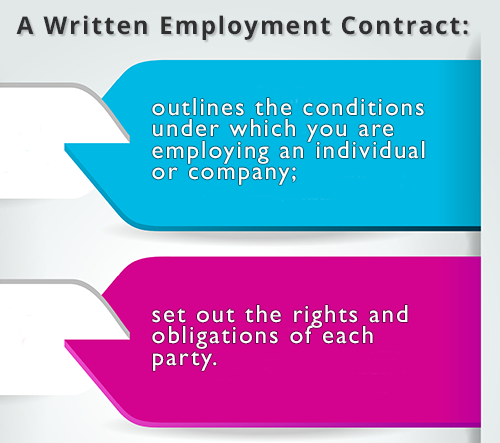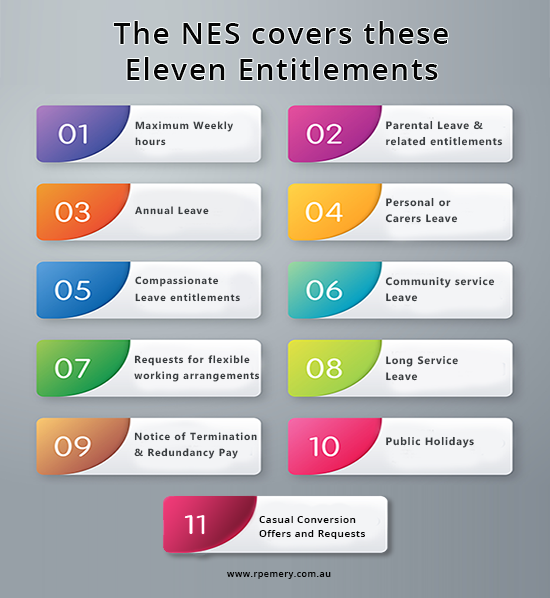Call Us -
1800 608 088


Employing staff helps you grow your business so you can achieve your goals. It’s nice to see success and more profit is always welcome!!
You might start off with casual or part-time staff, but then find you need full time employees or employees who are flexible.
Or perhaps you decide that employing staff directly isn’t optimal and you should be using contractors.
One thing is clear, there are a myriad of ways to employ people and each has its pros and cons, and legal requirements.
A written employment agreement that complies with Australian legislation minimises the potential for misunderstandings and conflict and reduces your risk of falling foul of the FWO (Fair Work Ombudsman).

In Australia, we have a great deal of work flexibility – staff are employed as casuals, part-time, full time, under fixed terms. There’s many ways to get your position filled.
Learn: About Employee types and your obligations under Australian Law.
Regardless of the type of employment, each employment relationship is governed by the Fair Work Act and the National Employment Standards or NES. More on the NES further down the page
 Full time Employment Contract
Full time Employment Contract This contract is for employees who are employed under a modern award where the standard award entitlements apply. Full time employee’s usually work at least 38 hours per week and are steadily and continuously employed. They usually have set hours and days of work. Full time employees are entitled to various benefits including sick leave, holiday leave, holiday pay and superannuation.
Learn: What is Full Time Employment?
 Casual Employment Contract
Casual Employment Contract This agreement is for casual employees who are employed under a modern award where the standard award entitlements apply. A Casual employee is generally hired on an informal, uncertain and irregular basis. They don’t usually receive sick leave or annual leave and should be paid a casual loading to offset this lack of entitlements.
Bar staff or shop assistants who are never exactly sure when they will be required for work are prime examples.
Learn: What is a Casual Employee?
Learn: Why use a Casual Employment Contract?
Learn: What is the difference between Casual and Part Time Employees?
 Permanent Part-time Employment Contract
Permanent Part-time Employment ContractThis employment contract is suitable for part time employees employed under a modern award where the standard award entitlements apply.
Part time employees work less hours than full time employees. However, they receive all of the entitlements of full time employees calculated on a proportional basis.
Learn: What is a Part-time employee?
Learn: What is Permanent Part Time Employment?
 Fixed Term Employment Agreement
Fixed Term Employment Agreement Suitable for Fixed Term employees employed under a modern award where the standard award entitlements apply.
A Fixed Term Employment Agreement is suitable for use where a staff member is being employed for a set length of time, with a specified end date for the employment. For example, to complete a specific project or to replace staff taking long service or maternity leave.
Learn: What is a Fixed Term Employment Contract?
 Individual Flexibility Agreement
Individual Flexibility Agreement This is an employment contract between a single employer and employee that modifies the application of a Modern Award or enterprise agreement. The Fair Work Act allows certain terms of the Modern Awards to be varied. This allows work conditions to be tailored to suit the individual requirements of employees (or employers), so long as overall, the employee is “better off”.
Learn: Why use Individual Flexibility Agreements?
Sometimes a business owner does not want or need to hire an employee. Perham’s you only need someone for a short term project or to fill in for a staff member who is on leave.
Engaging independent consultants can be a great way for you to get the help you need, when you need it, without committing to ongoing wage costs.
You can either hire a contractor who operates as a Sole trader or one who operates under a company umbrella.
TAKE CARE when deciding if you’re new hire is an employee or a contractor – the FWO (Fair Work Ombudsman) takes the issue of sham contracting very seriously and you can put your business at great financial risk if you try to treat an employee as a contractor.
 Sole Trader Contractor Agreement
Sole Trader Contractor Agreement The Sole Trader Contractors Agreement is a Contractors Agreement between a principal (usually a business or organisation) and an independent individual sole trader contractor. It spells out the exact nature of the arrangement, defining the rights and obligations of the parties.
 Incorporated Contractor Agreement
Incorporated Contractor Agreement This Corporate Contractor Services Agreement has been professionally drafted to spell out the exact nature of the arrangement, defining the rights and obligations of the parties.
It includes strict restraint, confidentiality and intellectual property provisions to bind the corporate entity and its employees while still providing the foundation for a healthy ongoing relationship.
 Labour Hire Agreement Template
Labour Hire Agreement Template You can use a Labour Hire Agreement Template to document the conditions under which one party (the Labour Hire Company) will supply personnel to another (the Client) on an hourly basis over a set period.
Our labour hire agreement governs the relationship between the parties and covers considerations such as fees payable, occupational health and safety, insurance, timesheets, confidential information limitations of liability and much more.
In July 2009 the Australian Federal Government reformed the workplace relations landscape and employment law with the introduction of the Fairwork Act. Along with establishing the new workplace relations system, the Act introduced the National Employment Standards (NES) and Modern Awards.
The National Employment Standards set out 11 minimum workplace entitlements that apply to all employers and employees in the national workplace relations system.

As a consequence all contracts of employment, whether they are based on a Modern Award or not, must cover the 11 National Employment Standards.
As well as the NES, an effectively drafted employment contract will clearly spell out the enforceable legal obligations of the parties, both during and after the employment term.
You have flexibility in your approach both to the Award conditions and the National Employment Standards, and you can negotiate almost anything you like with an individual employee as long as you can demonstrate that he or she is better off over-all as a result of the bargain you strike.
 Workplace Policy Template
Workplace Policy TemplateHaving a workplace policy in place offers many positive benefits to both your staff and your business. Setting clear guidelines, policies and procedures enables staff to have a clearer idea of their role and can increase efficiency and boost confidence.
A well written workplace policy can be a positive way to define your business and what it stands for.
 Social Media Policy Template
Social Media Policy TemplateInappropriate use of social media is growing as a reason cited for dismissals and legal action. What is considered “appropriate” use of social media by employees in (and out!) of the workplace is currently being shaped by cases considered by the Courts and Fair Work Commission.
Although the law surrounding this area is fast paced and still evolving, the Fair Work Commission has warned of the importance of Social Media Policies for this reason – and not just having a Social Media Policy – but bringing it into staff awareness and providing education about the practical application of the policy.
Infographic: Why employers need a Social Media Policy
Learn: How sloppy social media practise puts your business at risk
 Performance Management Template and Guidelines
Performance Management Template and GuidelinesManaging employee performance is a vital factor of the success of any business, which is why large businesses hire HR (Human Resources) people to look after staff.
But even if you run a small business it’s important to nurture your employees so you get the best out of them
This Performance Management Template and Guidelines is framework that you can use to set, monitor and review performance goals for your employees.
Even if you don’t have a background in HR, this practical and educational
document will outline how and why you should conduct performance management. It Includes easy to use templates for
Performance Reviews, Performance Improvement Plans along with all template
documents to support formal disciplinary processes.
 Employee Non Compete and Non Disclosure Agreement Template
Employee Non Compete and Non Disclosure Agreement TemplateNon compete or restraint provisions are a promise by an employee not to compete with his or her employer:
This contract restrains an employee from competing with the employer after s/he has left the employer’s service, whether by working for a competitor, or by setting up a competing business.
In addition the employee is bound to the non-disclosure of confidential information gained during the term of their employ.
Learn: Restraint of Trade and Employment Contracts
 An increase of platform work in the ‘gig economy’ signals a shift away from Australia’s standard employment model. The gig economy is a labour market comprising of independent contractors, online platform workers, contract firm workers, on-call workers and temporary workers. Most notable for its flexible nature, gig work offers individuals an alternative to a conventional 9-5 routine but employers should be aware of the risk of sham contracting to avoid the wrath of the Fair Work Ombudsman.
An increase of platform work in the ‘gig economy’ signals a shift away from Australia’s standard employment model. The gig economy is a labour market comprising of independent contractors, online platform workers, contract firm workers, on-call workers and temporary workers. Most notable for its flexible nature, gig work offers individuals an alternative to a conventional 9-5 routine but employers should be aware of the risk of sham contracting to avoid the wrath of the Fair Work Ombudsman.
 In March 2021, the Fair Work Act 2009 (Cth) was amended to add a new entitlement to the existing National Employment Standards (NES). The changes provide casual employees with the right to access permanent full time or part time employment if a specific set of criteria is met. This process is also known as ‘casual conversion.’
In March 2021, the Fair Work Act 2009 (Cth) was amended to add a new entitlement to the existing National Employment Standards (NES). The changes provide casual employees with the right to access permanent full time or part time employment if a specific set of criteria is met. This process is also known as ‘casual conversion.’
 On 26 March 2021, the Fair Work Act 2009 (Cth) was amended to change the workplace rights and obligations for casual employees. In order to ensure your employees are receiving the correct entitlements, it is important that you are up-to-date with these developments.
On 26 March 2021, the Fair Work Act 2009 (Cth) was amended to change the workplace rights and obligations for casual employees. In order to ensure your employees are receiving the correct entitlements, it is important that you are up-to-date with these developments.
 A growing number of employers admit to accessing the Facebook profiles of job candidates to more intimately assess their application – is this a good idea?
A growing number of employers admit to accessing the Facebook profiles of job candidates to more intimately assess their application – is this a good idea?
 Unpaid internships are gaining popularity but are they legal? Check out this summary of recent articles on unpaid internships.
Unpaid internships are gaining popularity but are they legal? Check out this summary of recent articles on unpaid internships.
 Employees have the right to be paid the correct pay rate for all time worked but some employers dodge their legal obligations and underpay their staff – this is referred as wage theft. Wage theft can take many forms – from not paying the right wage, not paying all the hours or not paying other entitlements like super. This article covers wage theft in all it’s forms and new legislation in Victoria that has made wage theft a crime.
Employees have the right to be paid the correct pay rate for all time worked but some employers dodge their legal obligations and underpay their staff – this is referred as wage theft. Wage theft can take many forms – from not paying the right wage, not paying all the hours or not paying other entitlements like super. This article covers wage theft in all it’s forms and new legislation in Victoria that has made wage theft a crime.
 Being flexible as an employer helps to foster an atmosphere of “give and take” in the workplace. We look at 10 reasons why you should consider offering employees flexible working arrangements.
Being flexible as an employer helps to foster an atmosphere of “give and take” in the workplace. We look at 10 reasons why you should consider offering employees flexible working arrangements.
 Thanks to an increasingly flexible workplace, it seems like when it comes to employee contracts, almost anything goes. But It’s important to classify your employees correctly so that they receive all their entitlements under the law and you comply with the legislation.
Thanks to an increasingly flexible workplace, it seems like when it comes to employee contracts, almost anything goes. But It’s important to classify your employees correctly so that they receive all their entitlements under the law and you comply with the legislation.
 Employment Contracts are ideal discussion points to be referred to when interviewing, recruiting and hiring staff. As the contracts cover the essentials, by working your way through the contract you can make sure you are not missing anything important.
Employment Contracts are ideal discussion points to be referred to when interviewing, recruiting and hiring staff. As the contracts cover the essentials, by working your way through the contract you can make sure you are not missing anything important.
 Probation periods of weeks or months are used by employers to assess the suitability of a new staff member. Fair Work provides these 6 free templates to help you manage the probation more effectively. It includes letters for successful and unsuccessful probation, checklists and performance plans.
Probation periods of weeks or months are used by employers to assess the suitability of a new staff member. Fair Work provides these 6 free templates to help you manage the probation more effectively. It includes letters for successful and unsuccessful probation, checklists and performance plans.
 Award rates increase on a regular basis, usually annually. You need to be aware of these increases so you can pay your employees correctly. This article covers info about rates increases and list useful tools to help you get employee payments right. Read more
Award rates increase on a regular basis, usually annually. You need to be aware of these increases so you can pay your employees correctly. This article covers info about rates increases and list useful tools to help you get employee payments right. Read more
 Under the Fair Work Act, an employer cannot require an employee to spend their pay in relation to the performance of work, if the requirement is “unreasonable”.
Under the Fair Work Act, an employer cannot require an employee to spend their pay in relation to the performance of work, if the requirement is “unreasonable”.
 Keeping good employment records can be tricky for many small business owners, sometimes it just seems like another time wasting piece of paperwork. If this is how you feel, then you might be interested in a new app called “record my Hours” . It helps employees and employers keep track of the hours worked.
Keeping good employment records can be tricky for many small business owners, sometimes it just seems like another time wasting piece of paperwork. If this is how you feel, then you might be interested in a new app called “record my Hours” . It helps employees and employers keep track of the hours worked.
 It can be especially challenging for small businesses to keep their operation running smoothly when staff take extended or excessive sick leave. How do you manage extended sick leave and what are your rights in dealing with excessive leave.
It can be especially challenging for small businesses to keep their operation running smoothly when staff take extended or excessive sick leave. How do you manage extended sick leave and what are your rights in dealing with excessive leave.
 In Australia, sick leave is covered as a type of “personal leave” in the National Employment Standards. Personal leave also includes carer’s leave and compassionate leave. This quick guide covers the essential facts that all employers should know about sick leave.
In Australia, sick leave is covered as a type of “personal leave” in the National Employment Standards. Personal leave also includes carer’s leave and compassionate leave. This quick guide covers the essential facts that all employers should know about sick leave.
 Round up of legal articles about mandatory vaccination in the workplace. What does it mean for employers, employees and your employment?
Round up of legal articles about mandatory vaccination in the workplace. What does it mean for employers, employees and your employment?
 As an employer, you can request that your employee work reasonable overtime hours. Overtime hours are extra hours worked by an employee / staff member. An employee can refuse overtime, if the overtime request is unreasonable. You should consider six issues that affect your overtime request.
As an employer, you can request that your employee work reasonable overtime hours. Overtime hours are extra hours worked by an employee / staff member. An employee can refuse overtime, if the overtime request is unreasonable. You should consider six issues that affect your overtime request.
 Despite the best laid plans of mice and men, sometimes an employer needs to change the employment roster. Can you do that without the employees consent? The answer is not as straightforward as you might think and there are a couple of steps to take to ensure you are complying with the law.
Despite the best laid plans of mice and men, sometimes an employer needs to change the employment roster. Can you do that without the employees consent? The answer is not as straightforward as you might think and there are a couple of steps to take to ensure you are complying with the law.
 The Fair Work Commission has released a series of changes following its four-yearly review of modern awards. The changes deal predominately with the issue of excessive annual leave accrued by employees. The changes cover directing employees to take leave, cashing out leave and taking leave in advance.
The Fair Work Commission has released a series of changes following its four-yearly review of modern awards. The changes deal predominately with the issue of excessive annual leave accrued by employees. The changes cover directing employees to take leave, cashing out leave and taking leave in advance.
 An Annual Shutdown is when an employer temporarily closes their business down during a slow business period. For example, the construction and manufacturing sectors usually close down at Christmas time. If you run a business there are some rules you need to follow when managing an Annual Shutdown.
An Annual Shutdown is when an employer temporarily closes their business down during a slow business period. For example, the construction and manufacturing sectors usually close down at Christmas time. If you run a business there are some rules you need to follow when managing an Annual Shutdown.
 When terminating or dismissing an employee, you need to make sure you comply with legislation, namely the Fair Work Act, 2009 and the National Employment Standards.
When terminating or dismissing an employee, you need to make sure you comply with legislation, namely the Fair Work Act, 2009 and the National Employment Standards.
 If you own and operate a small business, you might feel overwhelmed about the laws relating to the hiring and firing staff, particularly in times of economic uncertainty and instability. The situation has been clarified somewhat by the Small Business Fair Dismissal Code and Checklist made available by the Fair Work Commission.
If you own and operate a small business, you might feel overwhelmed about the laws relating to the hiring and firing staff, particularly in times of economic uncertainty and instability. The situation has been clarified somewhat by the Small Business Fair Dismissal Code and Checklist made available by the Fair Work Commission.
 Not sure how to put together a reference for your employee? Here is a sample employee reference letter you can use as a guide to get you started.
Not sure how to put together a reference for your employee? Here is a sample employee reference letter you can use as a guide to get you started.
 SBS has been the subject of a great deal of media attention for the sacking of Scott McIntyre. SBS’s managing director, Michael Ebeid made the decision to sack Scott McIntyre immediately and without notice. This raises questions about whether the dismissal was fair and lawful.
SBS has been the subject of a great deal of media attention for the sacking of Scott McIntyre. SBS’s managing director, Michael Ebeid made the decision to sack Scott McIntyre immediately and without notice. This raises questions about whether the dismissal was fair and lawful.
 Many business leaders and HR professionals are overwhelmed by what is required to comply with the new Workplace Bullying laws. Workplace managers are increasingly expected to take greater responsibility for the management, education and prevention of workplace bullying.
Many business leaders and HR professionals are overwhelmed by what is required to comply with the new Workplace Bullying laws. Workplace managers are increasingly expected to take greater responsibility for the management, education and prevention of workplace bullying.
 You could be forgiven for thinking that employment laws have gone mad following the Fair Work Commission’s decision that Facebook unfriending constituted bullying in the workplace. Is it really true? Or did the facts get lost in all the confusion and hype?
You could be forgiven for thinking that employment laws have gone mad following the Fair Work Commission’s decision that Facebook unfriending constituted bullying in the workplace. Is it really true? Or did the facts get lost in all the confusion and hype?
 The recent ruling by the Federal Court of Australia in Workpac v Skene has resulted in the potential classification of casual employees as permanent employees. This decision is significant for small businesses, many who employ staff on a casual basis, as staff may now be entitled to additional benefits. In this article, we discuss the impact of the decision and potential impacts on your business.
The recent ruling by the Federal Court of Australia in Workpac v Skene has resulted in the potential classification of casual employees as permanent employees. This decision is significant for small businesses, many who employ staff on a casual basis, as staff may now be entitled to additional benefits. In this article, we discuss the impact of the decision and potential impacts on your business.
 The FWC has made a decision that 20 year old employees working under the Retail Industry Award are now entitled to 100% of the adult wage rather than 90%.
The FWC has made a decision that 20 year old employees working under the Retail Industry Award are now entitled to 100% of the adult wage rather than 90%.
 Another recent case highlights the need for employers to tread very carefully when dealing with allegations of sexual harassment in the workplace – employee awarded $466,000 in compensation and damages. >
Another recent case highlights the need for employers to tread very carefully when dealing with allegations of sexual harassment in the workplace – employee awarded $466,000 in compensation and damages. >
 A recent case in the Federal Circuit Court highlights the importance of employers acting on complaints of sexual harassment by their employees.
A recent case in the Federal Circuit Court highlights the importance of employers acting on complaints of sexual harassment by their employees.
 A recent case in the Fair Work Commission highlights a lawful termination of an employee following the employee’s misuse of social media. There have been other cases concerning the dismissal of employees for inappropriate social media use that did not stack up to scrutiny. We look at why this case is different.
A recent case in the Fair Work Commission highlights a lawful termination of an employee following the employee’s misuse of social media. There have been other cases concerning the dismissal of employees for inappropriate social media use that did not stack up to scrutiny. We look at why this case is different.